Book contents
- Frontmatter
- Contents
- Preface
- List of abbreviations
- PART I THE CRITICAL TEXTS OF ANTIQUITY
- Introduction
- PART II THE PRACTICE OF MEMORY DURING THE PERIOD OF TRANSITION FROM CLASSICAL ANTIQUITY TO THE CHRISTIAN MONASTIC CENTURIES
- Introduction
- PART III THE BEGINNINGS OF THE SCHOLASTIC UNDERSTANDING OF MEMORY
- Introduction
- 13 Abelard
- 14 Memory and its uses: the relationship between a theory of memory and twelfth-century historiography
- PART IV ARISTOTLE NEO-PLATONISED: THE REVIVAL OF ARISTOTLE AND THE DEVELOPMENT OF SCHOLASTIC THEORIES OF MEMORY
- Introduction
- PART V LATER MEDIEVAL THEORIES OF MEMORY: THE VIA ANTIQUA AND THE VIA MODERNA.
- Introduction
- Conclusion: an all too brief account of modern theories of mind and remembering
- Bibliography
- Index
14 - Memory and its uses: the relationship between a theory of memory and twelfth-century historiography
Published online by Cambridge University Press: 06 January 2010
- Frontmatter
- Contents
- Preface
- List of abbreviations
- PART I THE CRITICAL TEXTS OF ANTIQUITY
- Introduction
- PART II THE PRACTICE OF MEMORY DURING THE PERIOD OF TRANSITION FROM CLASSICAL ANTIQUITY TO THE CHRISTIAN MONASTIC CENTURIES
- Introduction
- PART III THE BEGINNINGS OF THE SCHOLASTIC UNDERSTANDING OF MEMORY
- Introduction
- 13 Abelard
- 14 Memory and its uses: the relationship between a theory of memory and twelfth-century historiography
- PART IV ARISTOTLE NEO-PLATONISED: THE REVIVAL OF ARISTOTLE AND THE DEVELOPMENT OF SCHOLASTIC THEORIES OF MEMORY
- Introduction
- PART V LATER MEDIEVAL THEORIES OF MEMORY: THE VIA ANTIQUA AND THE VIA MODERNA.
- Introduction
- Conclusion: an all too brief account of modern theories of mind and remembering
- Bibliography
- Index
Summary
… the following are the main types of transformation [of an original story] likely to occur:
1. There will be much general simplification, due to the omission of material that appears irrelevant, to the construction gradually of a more coherent whole, and to the changing of the unfamiliar into some more familiar counterpart.
2. There will be persistent rationalisation, both of a whole story and of its details, until a form is reached which can be readily dealt with by all the subjects belonging to the special social group concerned. This may result in considerable elaboration.
3. There will be a tendency for certain incidents to become dominant, so that all the others are grouped about them.
It also seems probable that a cumulative form of story favours the retention of the general series of incidents with little change, and that whatever causes amusement is likely to be remembered and preserved. It may be to this last factor that the preservation of the novel in a commonplace setting is largely due.
F. C. Bartlett, Remembering, A Study in Experimental and Social Psychology (Cambridge, 1932), p. 138.Whenever a sign appeared at first glance to be relatively meaningless, or when it was seen to be unusually elaborate, or when, for any reason whatever, it was disliked, it was generally faced by a determined effort to remember. […]
- Type
- Chapter
- Information
- Ancient and Medieval MemoriesStudies in the Reconstruction of the Past, pp. 274 - 324Publisher: Cambridge University PressPrint publication year: 1992
- 1
- Cited by

